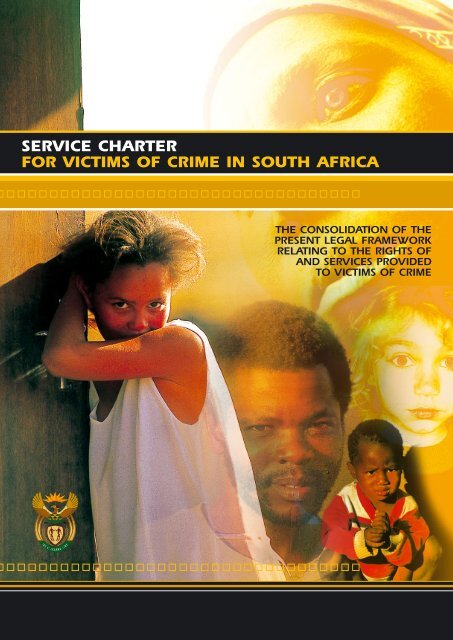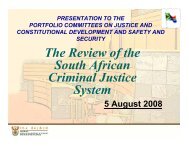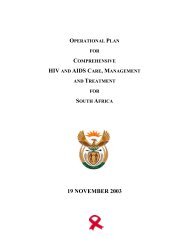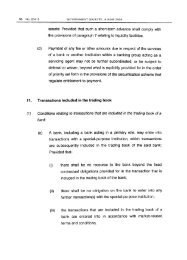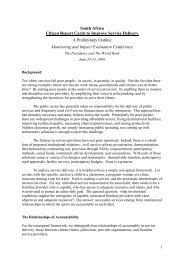Service Charter for Victims of Crime - National Prosecuting Authority
Service Charter for Victims of Crime - National Prosecuting Authority
Service Charter for Victims of Crime - National Prosecuting Authority
You also want an ePaper? Increase the reach of your titles
YUMPU automatically turns print PDFs into web optimized ePapers that Google loves.
SERVICE CHARTER<br />
FOR VICTIMS OF CRIME IN SOUTH AFRICA<br />
THE CONSOLIDATION OF THE<br />
PRESENT LEGAL FRAMEWORK<br />
RELATING TO THE RIGHTS OF<br />
AND SERVICES PROVIDED<br />
TO VICTIMS OF CRIME
TABLE OF CONTENTS<br />
FOREWORD BY THE MINISTER p. 1<br />
PREAMBLE<br />
• Affirming p. 2<br />
• Believing p. 2<br />
• Recognising p. 2<br />
• Noting p. 2<br />
• Hereby adopt this <strong>Victims</strong>’ <strong>Charter</strong> p. 2<br />
YOUR RIGHTS AS A VICTIM OF CRIME<br />
1. The right to be treated with fairness and with respect <strong>for</strong> your dignity and privacy p. 2<br />
2. The right to <strong>of</strong>fer in<strong>for</strong>mation p. 2<br />
3. The right to receive in<strong>for</strong>mation p. 3<br />
4. The right to protection p. 3<br />
5. The right to assistance p. 3<br />
6. The right to compensation p. 3<br />
7. The right to restitution p. 4<br />
COMPLAINTS p. 4<br />
MORE INFORMATION p. 5<br />
ACKNOWLEDGEMENTS p. 5
FOREWORD<br />
TABLE OF CONTENTS<br />
FOREWORD BY THE MINISTER FOR JUSTICE AND<br />
CONSTITUTIONAL DEVELOPMENT<br />
The <strong>Service</strong> <strong>Charter</strong> <strong>for</strong> <strong>Victims</strong> <strong>of</strong> <strong>Crime</strong> in South Africa (the “<strong>Victims</strong>’<br />
<strong>Charter</strong>”) is an important instrument <strong>for</strong> promoting justice <strong>for</strong> all. The<br />
<strong>Victims</strong>’ <strong>Charter</strong> is compliant with the spirit <strong>of</strong> the South African Constitution,<br />
1996, Act 108 <strong>of</strong> 1996, and the United Nations Declaration<br />
<strong>of</strong> Basic Principles <strong>of</strong> Justice <strong>for</strong> <strong>Victims</strong> <strong>of</strong> <strong>Crime</strong> and Abuse <strong>of</strong> Power,<br />
1985 (GA/RES/40/34).<br />
Since 1994, and in keeping with the cultivation <strong>of</strong> a human rights<br />
culture, the focus has gradually shifted from an adversarial and retributive<br />
criminal justice system to that <strong>of</strong> Restorative Justice. Central to<br />
the concept <strong>of</strong> Restorative Justice is the recognition <strong>of</strong> crime as more<br />
than an <strong>of</strong>fence against the state, but also as an injury or wrong<br />
done to another person. This is in line with the <strong>National</strong> <strong>Crime</strong> Prevention<br />
Strategy’s victim-centred vision <strong>for</strong> the criminal justice system.<br />
The ultimate goal is victim empowerment through meeting victims’<br />
needs, be they material or emotional.<br />
The <strong>Victims</strong>’ <strong>Charter</strong> and the attached minimum standards document<br />
are important instruments elaborating and consolidating rights and<br />
obligations relating to services applicable to victims and survivors <strong>of</strong><br />
crime in South Africa. The <strong>Victims</strong>’ <strong>Charter</strong> is consonant with the<br />
provisions <strong>of</strong> section 234 <strong>of</strong> the Constitution.<br />
I am confident that with the commitment and dedication <strong>of</strong> all roleplayers<br />
in the criminal justice process, this <strong>Victims</strong>’ <strong>Charter</strong> will assist in<br />
the implementation <strong>of</strong> the applicable laws in such a way that it serves<br />
its purpose - making justice a reality <strong>for</strong> all!<br />
Mrs BS Mabandla, MP<br />
Minister <strong>for</strong> Justice and Constitutional<br />
Development<br />
1
YOUR RIGHTS AS A VICTIM OF CRIME<br />
PREAMBLE<br />
The Government <strong>of</strong> South Africa generally and agencies involved in<br />
the criminal justice system specifically:<br />
Affirming<br />
Government’s commitment to implement measures aimed at continuous<br />
re<strong>for</strong>m <strong>of</strong> the criminal justice system to protect and promote<br />
the rights <strong>of</strong> victims in compliance with international obligations<br />
under international human rights instruments, such as the UN Declaration<br />
<strong>of</strong> Basic Principles <strong>of</strong> Justice <strong>for</strong> <strong>Victims</strong> <strong>of</strong> <strong>Crime</strong> and Abuse<br />
<strong>of</strong> Power (1985) and the Prevention and Eradication <strong>of</strong> Violence<br />
Against Women and Children Addendum to the 1997 SADC Declaration<br />
on Gender and Development;<br />
Believing<br />
That it is part <strong>of</strong> the responsibility <strong>of</strong> the state to promote the equal<br />
enjoyment <strong>of</strong> all the rights and freedoms that are guaranteed in the<br />
Constitution by all and that an equitable criminal justice system can<br />
only be achieved if the rights <strong>of</strong> both victims and accused persons<br />
are recognised, protected and balanced;<br />
YOUR RIGHTS AS A VICTIM OF CRIME<br />
If you have been a victim <strong>of</strong> crime the following rights, as contained<br />
in the Constitution and relevant legislation, will be upheld in your<br />
contact with the criminal justice system:<br />
1. The right to be treated with fairness and with respect<br />
<strong>for</strong> dignity and privacy:<br />
• You have the right to be attended to promptly and courteously,<br />
treated with respect <strong>for</strong> your dignity and privacy<br />
by all members <strong>of</strong> any department, institution, agency or<br />
organisation dealing with or providing a service to you<br />
(hereafter referred to as a service provider).<br />
• The police, during the investigations; the prosecutors and<br />
court <strong>of</strong>ficials during preparation <strong>for</strong> and during the trial<br />
proceedings; as well as all other service providers, will<br />
take measures to minimise any inconvenience to you by,<br />
among others, conducting interviews with you in your<br />
language <strong>of</strong> choice and in private, if necessary.<br />
• These measures will prevent you from being subjected to<br />
secondary victimisation.<br />
Recognising<br />
The serious impact <strong>of</strong> crime on victims, and its potential <strong>for</strong> undermining<br />
a victim’s human rights;<br />
Noting<br />
The significant progress made since the onset <strong>of</strong> democracy, with<br />
regard to trans<strong>for</strong>ming the criminal justice system to ensure access<br />
to justice and responsiveness <strong>of</strong> processes to all, regardless <strong>of</strong> race,<br />
gender, culture and class. That various measures have been implemented<br />
as part <strong>of</strong> the trans<strong>for</strong>mation <strong>of</strong> the justice system, with a<br />
view to ensuring the centrality <strong>of</strong> victims, balancing their rights with<br />
those <strong>of</strong> accused persons and minimising secondary victimisation in<br />
the various stages <strong>of</strong> the criminal justice process;<br />
Hereby adopt this <strong>Victims</strong>’ <strong>Charter</strong><br />
To provide <strong>for</strong> the consolidation <strong>of</strong> the present legal framework in<br />
South Africa relating to the rights <strong>of</strong> and services provided to victims<br />
<strong>of</strong> crime and to:<br />
• eliminate secondary victimisation in the criminal justice process;<br />
• ensure that victims remain central to the criminal justice process;<br />
• clarify the service standards that can be expected by and are to<br />
be accorded to victims whenever they come into contact with<br />
the criminal justice system; and<br />
• make provision <strong>for</strong> victims’ recourse when standards are not<br />
met.<br />
2. The right to <strong>of</strong>fer in<strong>for</strong>mation:<br />
• You have the right to <strong>of</strong>fer in<strong>for</strong>mation during the criminal<br />
investigation and trial.<br />
• The police, prosecutor and correctional services <strong>of</strong>ficial<br />
will take measures to ensure that any contribution that<br />
you wish to make to the investigation, prosecution and<br />
parole hearing is heard and considered when deciding<br />
on whether to proceed with the investigation, or in the<br />
course <strong>of</strong> the prosecution or Parole Board hearing.<br />
• This right means that you can participate (if necessary<br />
and where possible) in criminal justice proceedings, by<br />
attending the bail hearing, the trial, sentencing proceedings<br />
and/or Parole Board hearing.<br />
• It means that you will have the opportunity to make a<br />
further statement to the police if you realise that your first<br />
statement is incomplete; you may also, where appropriate,<br />
make a statement to the court or give evidence during<br />
the sentencing proceedings to bring the impact <strong>of</strong><br />
the crime to the court’s attention.<br />
• Furthermore, you may make a written application to<br />
the Chairperson <strong>of</strong> the Parole Board to attend the parole<br />
hearing and submit a written input.<br />
2
3. The right to receive in<strong>for</strong>mation:<br />
• You have the right to be in<strong>for</strong>med <strong>of</strong> your rights and <strong>of</strong><br />
how to exercise them.<br />
• You can, as part <strong>of</strong> this right, ask <strong>for</strong> explanations in your<br />
own language <strong>of</strong> anything you do not understand.<br />
• You have the right to receive in<strong>for</strong>mation and to be in<strong>for</strong>med<br />
<strong>of</strong> all relevant services available to you by service<br />
providers.<br />
• You will be in<strong>for</strong>med <strong>of</strong> your role in the case and <strong>of</strong> the<br />
approximate duration <strong>of</strong> the case. You can request in<strong>for</strong>mation<br />
regarding court dates, witness fees and the witness<br />
protection programme.<br />
• You can request to be in<strong>for</strong>med <strong>of</strong> the status <strong>of</strong> the case,<br />
whether or not the <strong>of</strong>fender has been arrested, charged,<br />
granted bail, indicted, convicted, or sentenced.<br />
• You may request reasons <strong>for</strong> a decision that has been<br />
taken in your case on whether to prosecute or not.<br />
• You are entitled to receive documents that the law entitles<br />
you to have access to.<br />
• You can request to receive notification <strong>of</strong> proceedings<br />
which you may attend.<br />
• You can request the prosecutor to notify your employer<br />
<strong>of</strong> any proceedings which necessitate your absence from<br />
work.<br />
• This right includes that in certain circumstances the court<br />
may prohibit the publication <strong>of</strong> any in<strong>for</strong>mation (including<br />
your identity), or it may order that the trial be held<br />
behind closed doors (in camera).<br />
• You can request Correctional <strong>Service</strong>s to in<strong>for</strong>m you if the<br />
<strong>of</strong>fender has escaped or has been transferred.<br />
5. The right to assistance:<br />
• You have the right to request assistance and, where relevant,<br />
have access to available social, health and counselling<br />
services, as well as legal assistance which is responsive<br />
to your needs.<br />
• The police will assist you by explaining police procedures,<br />
in<strong>for</strong>ming you <strong>of</strong> your rights and making the appropriate<br />
referral to other relevant service providers.<br />
• The <strong>of</strong>fice manager or head <strong>of</strong> <strong>of</strong>fice at the court will<br />
provide <strong>for</strong> the services <strong>of</strong> an interpreter.<br />
• The prosecutor will ensure that special measures are<br />
employed in relation to sexual <strong>of</strong>fences, domestic violence<br />
and child support or maintenance matters and<br />
that, where available, such cases are heard in specialised<br />
courts.<br />
• If you have special needs, all service providers will, within<br />
the scope <strong>of</strong> their functions, take all reasonable steps to<br />
accommodate you and ensure that you are treated in a<br />
sensitive manner.<br />
4. The right to protection:<br />
• You have the right to be free from intimidation, harassment,<br />
fear, tampering, bribery, corruption and abuse. If<br />
you are a witness, you must report any such threats to<br />
the police or senior state prosecutor.<br />
• The police will, if you comply with certain requirements,<br />
apply <strong>for</strong> you to be placed in a witness protection programme.<br />
• If such an application is successful, you will be placed<br />
in a witness protection programme where you will be<br />
protected, as far as possible, from all <strong>for</strong>ms <strong>of</strong> undue influence,<br />
harassment or intimidation.<br />
• This will ensure your safety as a witness and the availability<br />
<strong>of</strong> your testimony, and prevent you from withdrawing<br />
from giving evidence as a result <strong>of</strong> undue influence.<br />
6. The right to compensation:<br />
• You have the right to compensation <strong>for</strong> loss <strong>of</strong> or damage<br />
to property suffered as a result <strong>of</strong> a crime being committed<br />
against you.<br />
• You can request to be present at court on the date <strong>of</strong><br />
sentencing <strong>of</strong> the accused and request the prosecutor to<br />
apply to court <strong>for</strong> a compensation order in terms <strong>of</strong> section<br />
297 and 300 <strong>of</strong> the Criminal Procedure Act, Act 51<br />
<strong>of</strong> 1977.<br />
• “Compensation” refers to an amount <strong>of</strong> money that a<br />
criminal court awards the victim who has suffered loss<br />
or damage to property, including money, as a result <strong>of</strong> a<br />
criminal act or omission by the person convicted <strong>of</strong> committing<br />
the crime.<br />
• The prosecutor will in<strong>for</strong>m you if a compensation order<br />
has been granted, explain its contents and how to en<strong>for</strong>ce<br />
it. You can institute a civil action against the accused<br />
where the criminal court did not grant a compensation<br />
3
YOUR RIGHTS AS A VICTIM OF CRIME<br />
order. This will usually happen where the damages are<br />
not easily quantifiable in financial terms, <strong>for</strong> example, in<br />
the case <strong>of</strong> psychological damages or pain and suffering.<br />
• The clerk <strong>of</strong> the court will assist you with the en<strong>for</strong>cement<br />
<strong>of</strong> a compensation order granted by the court.<br />
7. The right to restitution:<br />
• “Restitution” refers to cases where the court, after conviction,<br />
orders the accused to give back to you the property<br />
or goods that have been taken from you unlawfully,<br />
or to repair the property or goods that have been unlawfully<br />
damaged, in order to restore the position you<br />
were in prior to the commission <strong>of</strong> the <strong>of</strong>fence.<br />
• The prosecutor will in<strong>for</strong>m you what restitution involves<br />
and the clerk <strong>of</strong> the court will assist you in en<strong>for</strong>cing this<br />
right.<br />
• You have the right to restitution in cases where you have<br />
been unlawfully dispossessed <strong>of</strong> goods or property, or<br />
where your goods or property have been damaged unlawfully.<br />
COMPLAINTS<br />
Keeping in mind that you have the right to complain, you can contact<br />
the particular government department or service provider if you<br />
have any complaints with regard to the service you are receiving, or<br />
if your rights are not being observed. If you are not satisfied with<br />
the way in which your complaint is handled, you can also contact<br />
organisations such as:<br />
a. The Office <strong>of</strong> the Public Protector<br />
b. The South African Human Rights Commission<br />
c. The Commission on Gender Equality<br />
d. The Independent Complaints Directorate<br />
e. Metropolitan Police Offices<br />
f. The Health Pr<strong>of</strong>essions Council <strong>of</strong> South Africa<br />
g. A lawyer <strong>of</strong> your own choice and at your own expense<br />
The role-players in the criminal justice system will ensure that copies<br />
<strong>of</strong> the <strong>Victims</strong>’ <strong>Charter</strong> are available at the following <strong>of</strong>fices:<br />
• Courts<br />
• Offices <strong>of</strong> the Department <strong>of</strong> Correctional <strong>Service</strong>s<br />
• Offices <strong>of</strong> Directors <strong>of</strong> Public Prosecutions<br />
• Prisons<br />
• Police Stations and Investigation Units<br />
• Offices <strong>of</strong> Social <strong>Service</strong>s or agencies<br />
• Offices <strong>of</strong> the Metropolitan Police <strong>Service</strong><br />
• Public Health Facilities<br />
For more detailed in<strong>for</strong>mation relating to any aspect <strong>of</strong> the<br />
<strong>Victims</strong>’ <strong>Charter</strong>, please refer to the Minimum Standards on<br />
<strong>Service</strong>s <strong>for</strong> <strong>Victims</strong> <strong>of</strong> <strong>Crime</strong>. This document is available at<br />
the <strong>of</strong>fices <strong>of</strong> role-playing government departments.<br />
4
MORE INFORMATION<br />
If you require more in<strong>for</strong>mation on any issue contained in this<br />
document, you can contact the Department <strong>of</strong> Justice and<br />
Constitutional Development’s Gender Directorate at the following<br />
numbers:<br />
Tel: (012) 315 1670<br />
Fax: (012) 315 1960<br />
Email: Victim<strong>Charter</strong>@justice.gov.za<br />
Toll-free number: 0800 011 022<br />
ACKNOWLEDGEMENTS<br />
The <strong>Service</strong> <strong>Charter</strong> <strong>for</strong> <strong>Victims</strong> <strong>of</strong> <strong>Crime</strong> in South Africa was<br />
developed by the Gender Directorate in the Department <strong>of</strong><br />
Justice and Constitutional Development, in co-operation with<br />
the Departments <strong>of</strong> Social Development, Correctional <strong>Service</strong>s,<br />
Education, and Health, as well as with the <strong>National</strong> <strong>Prosecuting</strong><br />
<strong>Authority</strong>, the South African Police <strong>Service</strong>, the South African<br />
Law Re<strong>for</strong>m Commission, the South African Human Rights<br />
Commission, the Office <strong>of</strong> the Public Protector, the Independent<br />
Complaints Directorate, members <strong>of</strong> the Magistrates and<br />
Judicial <strong>Service</strong> Commissions and members <strong>of</strong> Tshwane Metro<br />
Police.<br />
The Department <strong>of</strong> Justice and Constitutional Development<br />
deeply appreciates the contributions also made by the various<br />
non-governmental organisations and academic institutions to<br />
the development <strong>of</strong> the <strong>Victims</strong>’ <strong>Charter</strong>.<br />
5
DEPARTMENT OF JUSTICE AND<br />
CONSTITUTIONAL DEVELOPMENT<br />
Private Bag X81<br />
Pretoria, 0001<br />
329 Pretorius Street, Momentum Building<br />
Pretoria, 0002


